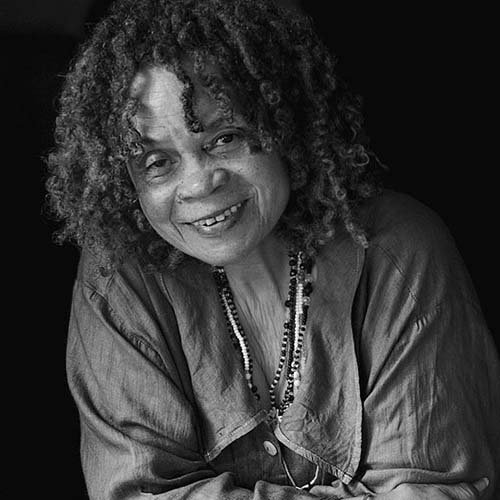SONIA SANCHEZ
Biography
Sonia Sanchez was born Wilsonia Benita Driver on September 9, 1934, in Birmingham, Alabama. After her mother died in childbirth a year later, Sanchez lived with her paternal grandmother and other relatives for several years. In 1943, she moved to Harlem with her sister to live with their father and his third wife. She married and divorced Albert Sanchez, a Puerto Rican immigrant whose surname she kept. She was also married for two years to Etheridge Knight.
Sanchez earned a BA in political science from Hunter College in 1955. She also did postgraduate work at New York University and studied poetry with Louise Bogan. Sanchez formed a writers’ workshop in Greenwich Village, attended by such poets as Amiri Baraka (LeRoi Jones), Haki R. Madhubuti (Don L. Lee), and Larry Neal. Along with Knight, Madhubuti, and Nikki Giovanni, she formed the “Broadside Quartet” of young poets, introduced and promoted by Dudley Randall.
During the early 1960s, Sanchez was an integrationist, supporting the philosophy of the Congress of Racial Equality (CORE). But after considering the ideas of Black Muslim leader Malcolm X, who believed Black people would never be truly accepted by white people in the United States, she focused more on her Black heritage from a separatist point of view. (Full bio)
Plays
The Bronx Is Next (1968)
Sanchez's first play, The Bronx Is Next, is a provoking commentary on interracial racism and interracial sexism that premiered in The Drama Review in 1968. The play follows Charles, Roland, and Jimmy, three Black Revolutionaries forcing tenants into the streets as part of their organization's protest plan to burn out the horrible tenements of Harlem. The play typifies Sanchez's bold spirit as it illustrates her early capacity to celebrate the Black Power Movement and critique it at the same time. The patriarchal oppression of women within the Black Power Movement is thus central to the play's impact both in the ‘60s and today. (Source)
Cast Requirement: 7 (2f, 5m)
Characters: Charles, Old Sister, Larry, Roland, Jimmy, White Cop, Black Bitch
Publication Info: I'm Black When I'm Singing, I'm Blue When I Ain't and Other Plays. Duke University Press, 2010. (Link)
SOS-Calling All Black People: A Black Arts Movement Reader. Edited by James Edward Smethurst, Sonia Sanchez, and John H. Bracey. University of Massachusetts Press, Amherst, 2014. (Link)
+ More Info
SISTER SON/JI (1969)
Sister Son/ji, in part, explores the vital role in the movement of college students whose personal interactions often mimicked confrontational, unhealthy male/female relationships derived from sexist behavior within the larger black (militant) community. Descriptions of social and personal divisions among characters in the play emphasize Sanchez's criticisms of black paternalism within the movement, continuing Sanchez's unflinching examination of paradoxical notions of liberation in the Black Power Movement. (Source)
Cast Requirement: 1 (1f)
Characters: Sister Son/ji
Publication Info: I'm Black When I'm Singing, I'm Blue When I Ain't and Other Plays. Duke University Press, 2010. (Link)
+ More Info
DIRTY HEARTS (1971)
Dirty Hearts is an allegorical presentation of American racial and sexual politics worked out in the dynamics of a card game that dooms the player who receives the most points. Characters in this play turn to intensely lyrical poetic dialogue to emphatically express their deepest emotions. In Dirty Hearts, Shigeko, a disfigured victim of the atomic bomb—a Hiroshima maiden—is a main, although disempowered, player in the game. She exposes the wounds of her body and soul in lyrical, ritualized poetic lines. (Source)
Cast Requirement: 5 (1f, 4m)
Characters: First Man, Second Man, Shigeko, Carl, The Poet
Publication Info: I'm Black When I'm Singing, I'm Blue When I Ain't and Other Plays. Duke University Press, 2010. (Link)
MALCOLM/MAN DON’T LIVE HERE NO MO (1972)
Malcolm/Man Don’t Live Here No Mo, Sanchez’s first drama written completely in verse, was commissioned for children’s theater. The play is simpler than her previous dramatic works are but still does not avoid the political complexities of Malcolm X’s life. Malcolm/Man focuses on certain key events in X’s life—his conversion, marriage, and death. The play protests “wite/amurica” and its oppressive treatment of American blacks... Although intended for children, the work engages militant rhetorical modes—ritual movement, expression in colloquial language, refusal of standard orthography, irony, and call for commitment. (Source)
Cast Requirement: 5 (4f, 1m)
Characters: Brotha, Sistuh, Chorus (3 Sistuhs)
Publication Info: I'm Black When I'm Singing, I'm Blue When I Ain't and Other Plays. Duke University Press, 2010. (Link)
Uh UH; BUT HOW DO IT FReE US? (1974)
The play presents one critical issue that runs through each of her other longer plays—the weakening distracted state that was in part a result of unhealthy behaviors in the black militant community. Uh, Uh is a haunting depiction of the undermining effects of drug use, chauvinism, and hedonism on some members of the movement. The play also interrogates experimental roles, abusive behavior, and hypocrisy in the black community. (Source)
Cast Requirement: 13+ (6f, 7m, Dancers)
Characters: Malik, Waleesha, Nefertia, Sister Whore, White Whore, Three Brothers and One White Man, Brother Man, Brother, Sister, Devil/Woman, Dancers
Publication Info: I'm Black When I'm Singing, I'm Blue When I Ain't and Other Plays. Duke University Press, 2010. (Link)
The New Lafayette Theatre Presents Plays with Aesthetic Comments by 6 Black Playwrights. Edited by Ed Bullins. Anchor/Doubleday Press, 1974. (Link)
I’M BLACK WHEN I’M SINGING, I’m blue when i ain’t (1982)
Reena—a gifted young musician and singer—is confined to an insane asylum because of numerous personal traumas in her life. In response to familial rejection primarily because of her dark black skin, she suffers from severe self-loathing. Her mother is both color-struck and judgmental, her husband, abusive and controlling. As a result, Reena suffers from multiple personality disorder. This central conflict of the play is informed by similarities of Reena’s selves to four historical black female singers. (Source)
Cast Requirement: 16 (8f, 7m, 1any)
Characters: Reena/Mama B/Toni, Malika, Doctor, Attendant, Sam, Catholic Matron, Business Manager, Mary, John, Josephine, Chorus of Male Dancers, Chorus of Female Dancers
Publication Info: I'm Black When I'm Singing, I'm Blue When I Ain't and Other Plays. Duke University Press, 2010. (Link)
+ More Info
2X2 (2009)
Sanchez’s most recent play, 2x2, provides a personal examination of the impact of activism and generational difference as these have over time variously affected the black community. In 2x2, Sanchez reminds us that many of the issues that plagued early black communities continue to exist—if in different forms and varying dynamics. Completed in the spring of 2009, 2x2 is the most recent opportunity Sanchez offers us to examine through a new play the next stages, as she sees them, in the ongoing legacy of the Black Power movement in the lives of men and women in black America. (Source)
Cast Requirement: 5 (3f, 2m)
Characters: Beverly Smith, Ramona Smith, Jamal, Nia, Shaquille
Publication Info: I'm Black When I'm Singing, I'm Blue When I Ain't and Other Plays. Duke University Press, 2010. (Link)
Resources
Other writings by SANCHEZ
Poetry:
Homecoming Poems (1969)
We a BaddDDD People (1970)
Liberation Poems (1971)
It's a New Day: Poems for Young Brothas and Sistuhs (1971)
A Blues Book for Blue Black Magical Women (1973)
Love Poems (1973)
I've Been a Woman: New and Selected Poems (1981)
Homegirls and Handgrenades: Poems (1985)
Under a Soprano Sky: Poems (1987)
Shake Down Memory and Continuous Fire (1991)
Wounded in the House of a Friend (1995)
Does Your House Have Lions? (1997)
Shake Loose My Skin: New and Selected Poems (1999)
Interviews and Talks:

